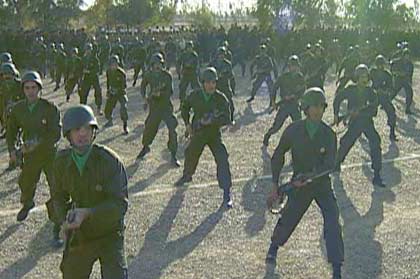| Both Republicans and Democrats have received substantial fees to talk at MEK events, while advocating in Washington on the group’s behalf. |
 On Friday, the State Department removed Iranian exile group MEK (Mujahedin-e-Khalq) from its list of foreign terrorist organizations. Over the weekend, commentators responded to the news with skepticism over the motives, procedures, political maneuvers and payoffs that seem to determine which groups do or do not count as terrorists.
On Friday, the State Department removed Iranian exile group MEK (Mujahedin-e-Khalq) from its list of foreign terrorist organizations. Over the weekend, commentators responded to the news with skepticism over the motives, procedures, political maneuvers and payoffs that seem to determine which groups do or do not count as terrorists.
MEK, Iranian dissidents who lost a power struggle with Ayatollah Khomenei supporters in the years following the 1979 Islamic Revolution, relocated to Iraq and established allegiances with Saddam Hussein. For 15 years the group has been listed among foreign terrorist organizations by the State Department. Although considered cultish by many, MEK has preserved and fostered strong U.S. ties, especially among a handful of conservatives, who share the group’s desire to overthrow Iran’s government. Both Republicans and Democrats have received substantial fees to talk at MEK events, while advocating in Washington on the group’s behalf.
As Joshua Keating at Foreign Policy noted Monday, there is reason for cynicism about the declassification “after the group [MEK] waged a years-long PR, lobbying, and advertising campaign, paying political VIPs including Rudy Giuliani, Howard Dean, Tom Ridge, and Ed Rendell tens of thousands of dollars to endorse their cause.” Keating adds, however, that MEK have indeed not carried out a terrorist attack in years, but, going by the language of the Patriot Act alone, many more groups aside from MEK should then be removed from the terrorist list too.
Salon’s old friend Glenn Greenwald was less generous than Keating in a Guardian comment piece Sunday. He calls U.S. dealings with MEK a “scam,” which “more vividly illustrates the rot and corruption at the heart of America’s D.C.-based political culture than almost any episode [he] can recall.”
In an extensive, important post noting key takeaways from the episode, Greenwald argues:
The history of the US list of designated terrorist organizations, and its close cousin list of state sponsors of terrorism, is simple: a country or group goes on the list when they use violence to impede US interests, and they are then taken off the list when they start to use exactly the same violence to advance US interests. The terrorist list is not a list of terrorists; it’s a list of states and groups which use their power to defy US dictates rather than adhere to them.
The NYU scholar Remi Brulin has exhaustively detailed the rank game-playing that has taken place with this list: Saddam was put on it when he allied with the Soviets in the early 1980s, then was taken off when the US wanted to arm and fund him against Iran in the mid-1980s, then he was put back on in the early 1990s when the US wanted to attack him.
And now, with the MEK, we have a group that, at least according to some reports, appears to have intensified its terrorism, and yet they are removed from the list. Why? Because now they are aligned against the prime enemy of the US and Israel – and working closely with those two nations – and are therefore, magically, no longer “terrorists.”
http://www.salon.com/2012/09/24/once_a_terrorist_not_always_a_terrorist/singleton/
